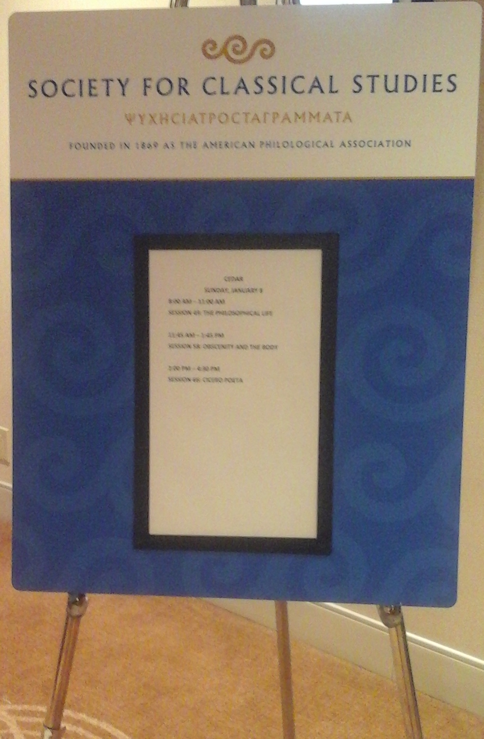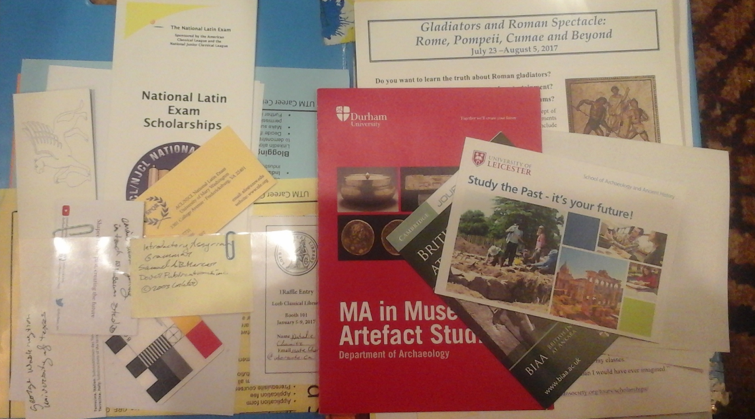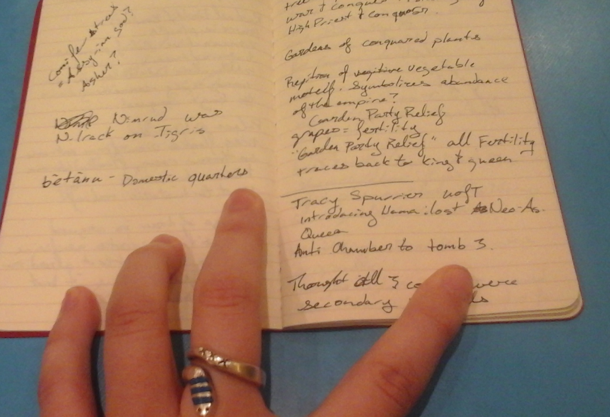
View of Podium between Sessions.
Academic conferences are one area of scholarship that is often overlooked by students at the undergraduate level. I have had the good fortune to attend two thus far (though I have been aware of quite a few more than that). The first time I attended I was in school in Newfoundland and the Humanities and Social Science Congress took place in British Columbia. I knew no one there I didn’t plan my time out very well.
The second time I attended was the joint AIA/SCS meeting here in Toronto. I knew two other undergraduates as well as a number of professors and a curator in attendance. I had a detailed schedule and a basic idea about the topics of all but one of the papers I attended (12 papers, 1 discussion, 1 society meeting, 1 workshop).
I loved every minute of both conferences but I would recommend the second option for your first time out.

Session list for one room on 8, January 2017
You, young historian, just discovered a conference in your area. Maybe a professor emailed you or you saw a poster or a journal you subscribe to had an ad or a call for papers. No matter how you found it it’s there. First things first: funding. You don’t really want to spend +200USD to attend. Here you have a few options: you can volunteer your time, spending a set amount of hours working and the rest attending papers; or you can request funding from your institution. I was lucky my department had funding for four Classics majors to attend and my application was accepted.
Conferences often have other perks or discounts for attendees. Both the two I attended offered lower rates for rooms. I took advantage of that in Victoria but opted to stay at home and take the subway to the hotel in Toronto. Both have their merits but I prefer staying on site when I can: no bulky coat to carry, and a place to drop off the bits you collect throughout the day – paper hand outs, ads for books, Masters program pamphlets, etc. but when cost is a factor staying in your own bed can be just as nice.

Selection of business cards, fieldschool paperwork, and pamphlets I collected.
Focusing your attention to specific genera of papers helps whittle down the hundreds of papers to a more manageable number. I focused on museums, technology in Archaeology, and Achaemenid history. The first and last because this is where my studies focus and the second because it is an exciting field I want to know more about. The one session I was not prepared for was on a topic I know nothing about (the 8AM start time didn't help either) but at a university reception the night before I learned how to politely enter and exit in the middle of sessions: between papers.

One page of my notes. I prefer Moleskin but any pen and paper will work.
Those receptions are a great place to meet other scholars. I was lucky because one of Toronto's professors introduced me to people she thought were important including curators and professors from other institutions.
My recommendation is to attend conferences during your undergrad when you aren't expected to ask questions during sessions and where people are a little more forgiving because you'll likely have to attend them in your professional historical career.
If you are really lucky you might see the next Chicken Paper
Doug Zongker's "Chicken chicken chicken". Presented at the AAAS humor session, February 16, 2007
Photos by N Chomitz, 2017
